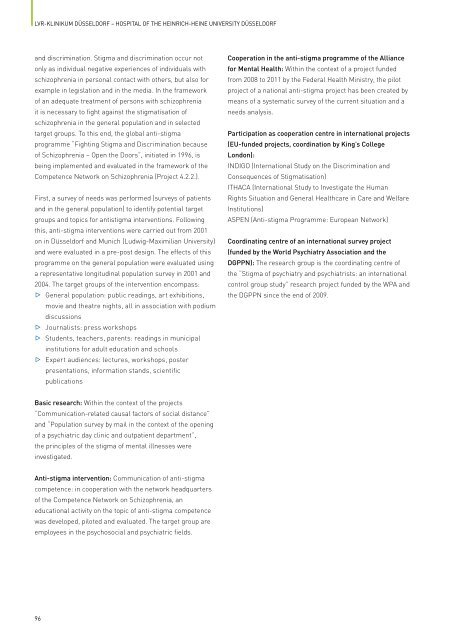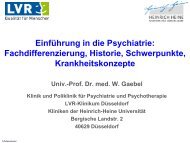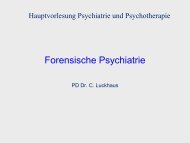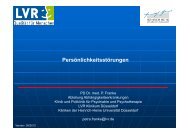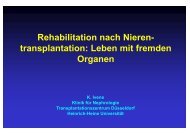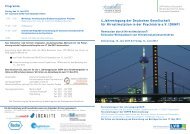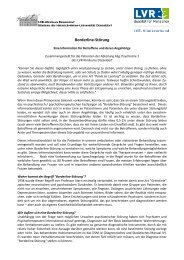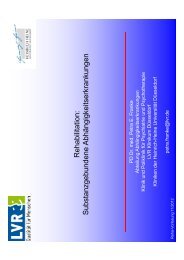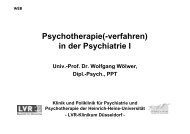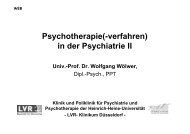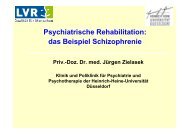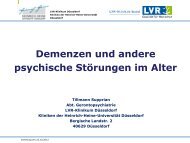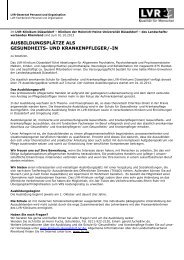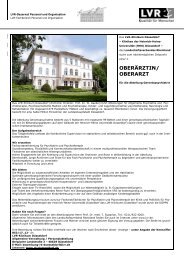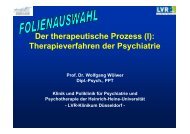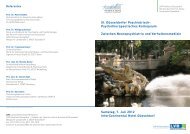LVR-Klinikum Düsseldorf Hospital of the Heinrich-Heine University ...
LVR-Klinikum Düsseldorf Hospital of the Heinrich-Heine University ...
LVR-Klinikum Düsseldorf Hospital of the Heinrich-Heine University ...
Create successful ePaper yourself
Turn your PDF publications into a flip-book with our unique Google optimized e-Paper software.
<strong>LVR</strong>-KLINIKUM DÜsseLDORF – hOsPITaL OF The heINRIch-heINe UNIVeRsITY DÜsseLDORF<br />
and discrimination. Stigma and discrimination occur not<br />
only as individual negative experiences <strong>of</strong> individuals with<br />
schizophrenia in personal contact with o<strong>the</strong>rs, but also for<br />
example in legislation and in <strong>the</strong> media. In <strong>the</strong> framework<br />
<strong>of</strong> an adequate treatment <strong>of</strong> persons with schizophrenia<br />
it is necessary to fight against <strong>the</strong> stigmatisation <strong>of</strong><br />
schizophrenia in <strong>the</strong> general population and in selected<br />
target groups. To this end, <strong>the</strong> global anti-stigma<br />
programme “Fighting Stigma and Discrimination because<br />
<strong>of</strong> Schizophrenia – Open <strong>the</strong> Doors”, initiated in 1996, is<br />
being implemented and evaluated in <strong>the</strong> framework <strong>of</strong> <strong>the</strong><br />
Competence Network on Schizophrenia (Project 4.2.2.).<br />
First, a survey <strong>of</strong> needs was performed (surveys <strong>of</strong> patients<br />
and in <strong>the</strong> general population) to identify potential target<br />
groups and topics for antistigma interventions. Following<br />
this, anti-stigma interventions were carried out from 2001<br />
on in <strong>Düsseldorf</strong> and Munich (Ludwig-Maximilian <strong>University</strong>)<br />
and were evaluated in a pre-post design. The effects <strong>of</strong> this<br />
programme on <strong>the</strong> general population were evaluated using<br />
a representative longitudinal population survey in 2001 and<br />
2004. The target groups <strong>of</strong> <strong>the</strong> intervention encompass:<br />
s General population: public readings, art exhibitions,<br />
movie and <strong>the</strong>atre nights, all in association with podium<br />
discussions<br />
s Journalists: press workshops<br />
s Students, teachers, parents: readings in municipal<br />
institutions for adult education and schools<br />
s Expert audiences: lectures, workshops, poster<br />
presentations, information stands, scientific<br />
publications<br />
Basic research: Within <strong>the</strong> context <strong>of</strong> <strong>the</strong> projects<br />
“Communication-related causal factors <strong>of</strong> social distance”<br />
and “Population survey by mail in <strong>the</strong> context <strong>of</strong> <strong>the</strong> opening<br />
<strong>of</strong> a psychiatric day clinic and outpatient department”,<br />
<strong>the</strong> principles <strong>of</strong> <strong>the</strong> stigma <strong>of</strong> mental illnesses were<br />
investigated.<br />
Anti-stigma intervention: Communication <strong>of</strong> anti-stigma<br />
competence: in cooperation with <strong>the</strong> network headquarters<br />
<strong>of</strong> <strong>the</strong> Competence Network on Schizophrenia, an<br />
educational activity on <strong>the</strong> topic <strong>of</strong> anti-stigma competence<br />
was developed, piloted and evaluated. The target group are<br />
employees in <strong>the</strong> psychosocial and psychiatric fields.<br />
96<br />
Cooperation in <strong>the</strong> anti-stigma programme <strong>of</strong> <strong>the</strong> Alliance<br />
for Mental Health: Within <strong>the</strong> context <strong>of</strong> a project funded<br />
from 2008 to 2011 by <strong>the</strong> Federal Health Ministry, <strong>the</strong> pilot<br />
project <strong>of</strong> a national anti-stigma project has been created by<br />
means <strong>of</strong> a systematic survey <strong>of</strong> <strong>the</strong> current situation and a<br />
needs analysis.<br />
Participation as cooperation centre in international projects<br />
(EU-funded projects, coordination by King’s College<br />
London):<br />
INDIGO (International Study on <strong>the</strong> Discrimination and<br />
Consequences <strong>of</strong> Stigmatisation)<br />
ITHACA (International Study to Investigate <strong>the</strong> Human<br />
Rights Situation and General Healthcare in Care and Welfare<br />
Institutions)<br />
ASPEN (Anti-stigma Programme: European Network)<br />
Coordinating centre <strong>of</strong> an international survey project<br />
(funded by <strong>the</strong> World Psychiatry Association and <strong>the</strong><br />
DGPPN): The research group is <strong>the</strong> coordinating centre <strong>of</strong><br />
<strong>the</strong> “Stigma <strong>of</strong> psychiatry and psychiatrists: an international<br />
control group study” research project funded by <strong>the</strong> WPA and<br />
<strong>the</strong> DGPPN since <strong>the</strong> end <strong>of</strong> 2009.


